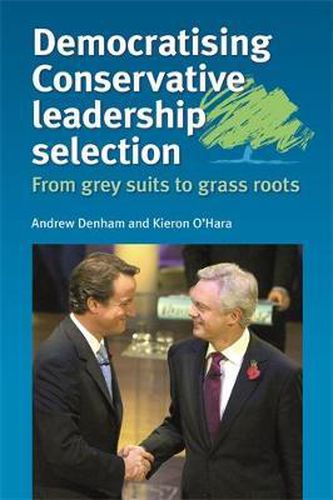Readings Newsletter
Become a Readings Member to make your shopping experience even easier.
Sign in or sign up for free!
You’re not far away from qualifying for FREE standard shipping within Australia
You’ve qualified for FREE standard shipping within Australia
The cart is loading…






Democratising Conservative Leadership Selection traces the effects of democracy on the British Conservative Party, specifically looking at how changes in the ways the Conservatives elect their leaders have altered their mandate to lead. The book includes analysis of the original undemocratic ‘system’ whereby a leader ‘emerged’ from a shadowy process of consultation, and of the six elections between 1965 and 1997 where the parliamentary Conservative Party alone chose the party leader. This historical perspective is followed by in-depth analysis of the three contests since 2001 that have taken place under the ‘Hague rules’, according to which ordinary party members have the final say. This is the most comprehensive account yet published of the operation of those rules on the Conservative Party and the legitimacy of its leadership, and of the election in 2005 of David Cameron, the most controversial Tory leader since Margaret Thatcher.Combining a detailed historical analysis of the process of choosing Conservative leaders, and of the contemporary issues surrounding Cameron’s attempts to ‘modernise’ the party, this book is essential reading for students, academic specialists and anyone interested in the recent history and contemporary practice of British Conservatism.
$9.00 standard shipping within Australia
FREE standard shipping within Australia for orders over $100.00
Express & International shipping calculated at checkout
Democratising Conservative Leadership Selection traces the effects of democracy on the British Conservative Party, specifically looking at how changes in the ways the Conservatives elect their leaders have altered their mandate to lead. The book includes analysis of the original undemocratic ‘system’ whereby a leader ‘emerged’ from a shadowy process of consultation, and of the six elections between 1965 and 1997 where the parliamentary Conservative Party alone chose the party leader. This historical perspective is followed by in-depth analysis of the three contests since 2001 that have taken place under the ‘Hague rules’, according to which ordinary party members have the final say. This is the most comprehensive account yet published of the operation of those rules on the Conservative Party and the legitimacy of its leadership, and of the election in 2005 of David Cameron, the most controversial Tory leader since Margaret Thatcher.Combining a detailed historical analysis of the process of choosing Conservative leaders, and of the contemporary issues surrounding Cameron’s attempts to ‘modernise’ the party, this book is essential reading for students, academic specialists and anyone interested in the recent history and contemporary practice of British Conservatism.